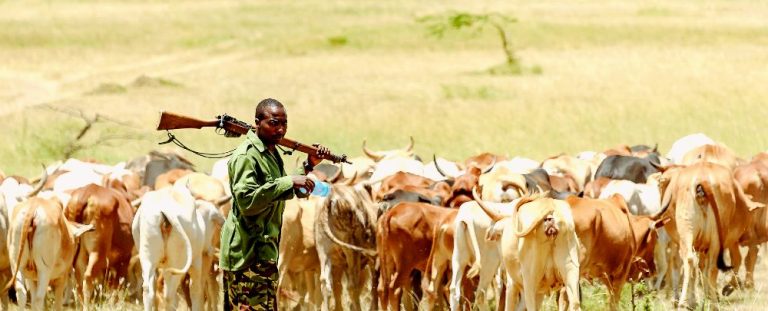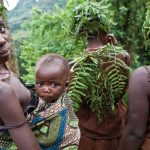Beyond Violence: Addressing the Complexity of Farmer-Herder Conflicts in West and Central Africa
A herder guarding his cattle in Kenya.
The surge in violence between farmers and herders in West and Central Africa has become one of the most pressing security challenges facing the region. With over 15,000 deaths linked to farmer-herder violence since 2010, half of which have occurred since 2018, the situation demands urgent attention. However, addressing this complex issue requires moving beyond simplistic narratives and recognizing the multifaceted drivers of conflict.
At its core, the escalation of farmer-herder tensions is rooted in growing competition over land and resources. As the rural population in the Sudano-Sahelian zone has increased by more than 40 percent over the past two decades, cropland has doubled, encroaching on traditional grazing areas. This land pressure has pushed herders into protected areas and increased their reliance on practices like tree branch lopping, often bringing them into conflict with security and forestry agents.
However, the problem goes beyond mere resource competition. Social inequalities, changing patterns of livestock ownership, and the erosion of traditional dispute resolution mechanisms have all contributed to the current crisis. In some areas, the shift in livestock ownership from rural pastoralist communities to wealthy urban dwellers has disrupted longstanding systems of mutual dependence between farmers and herders. This has been exacerbated by the breakdown of trusted dispute resolution institutions, often due to perceptions of corruption or bias.
The situation is further complicated by the involvement of militant Islamist groups, particularly in central Mali, northern Burkina Faso, and parts of Nigeria. These groups have instrumentalized intercommunal tensions to foster recruitment, conflating farmer-herder conflict with violent extremism. This has significantly muddied the security landscape, making it difficult to distinguish between local grievances and broader extremist agendas.
Addressing these challenges requires a nuanced, multifaceted approach. First and foremost, there is a need to differentiate between local grievances and armed extremist group activities in high-risk areas. Security forces must apply a discriminating approach in counterinsurgency efforts, protecting exposed communities while avoiding actions that could further alienate vulnerable populations.
Investing in improved land management infrastructure is crucial. This includes developing and maintaining maps and physical markers, as well as fostering community adherence to agreed-upon land regulations. Successful initiatives like RECOPA in Burkina Faso demonstrate the importance of involving a broad range of stakeholders – from traditional and religious leaders to civil society actors – in land governance decisions.
Training local leaders in dispute resolution techniques is another key strategy. By investing in mediation skills, communication dynamics, and cross-cultural competency, communities can rebuild trust and develop more effective mechanisms for resolving conflicts before they escalate into violence.
Perhaps most importantly, there is a critical need to build trust between communities and security forces. When local populations believe that security forces will respond quickly and impartially to outbreaks of violence, they are less likely to resort to extralegal actions. This requires developing mechanisms to increase the accountability and effectiveness of security forces, as well as improving their capacity for rapid response.
The farmer-herder conflict in West and Central Africa is a complex issue that defies simple solutions. However, by addressing the root causes of tension, improving land management practices, enhancing local dispute resolution capabilities, and fostering trust between communities and security forces, we can work towards mitigating this growing crisis. The stakes are high, but with concerted effort and a nuanced understanding of the problem, progress is possible.
-

Mali: Goïta reste président pour un mandat de cinq ans renouvelable
Rédaction: Reda El GhazalAu Mali, une nouvelle loi adoptée par le conseil de transition permet à Assimi Goïta de rester... Politique -

Niger : dix soldats tués dans des attaques près de la frontière burkinabè
Rédaction: Safae FathiDix soldats nigériens ont perdu la vie et quinze autres ont été blessés vendredi lors de deux attaques... Afrique -

RDC : un mini-réseau solaire stimule l’activité économique à Goma
Rédaction: Safae FathiLe quartier de Ndosho, à Goma dans l’est de la République démocratique du Congo, s’éclaire grâce à un... Centre Afrique -

Guinée : présentation d’un projet de Constitution, un référendum prévu en septembre
Rédaction : Widad WAHBI Un projet de nouvelle Constitution a été présenté cette semaine en Guinée, à la télévision nationale, marquant... Politique -

Tchad : Succès Masra suspend sa grève de la faim après sept jours en prison
Rédaction: Salma karmassAprès une semaine de grève de la faim en détention, l’opposant tchadien Succès Masra a mis un terme... Politique -

Uranium au Niger : une nationalisation audacieuse aux retombées incertaines
Rédaction : Widad WAHBI Le 19 juin 2025, le gouvernement militaire nigérien a annoncé, de manière abrupte, la nationalisation complète de... Économie

 Suivez les dernières nouvelles sur WhatsApp
Suivez les dernières nouvelles sur WhatsApp  Suivez les dernières nouvelles sur Telegram
Suivez les dernières nouvelles sur Telegram  Suivez les dernières nouvelles sur Google News
Suivez les dernières nouvelles sur Google News  Suivez les dernières nouvelles sur Nabd
Suivez les dernières nouvelles sur Nabd 


















